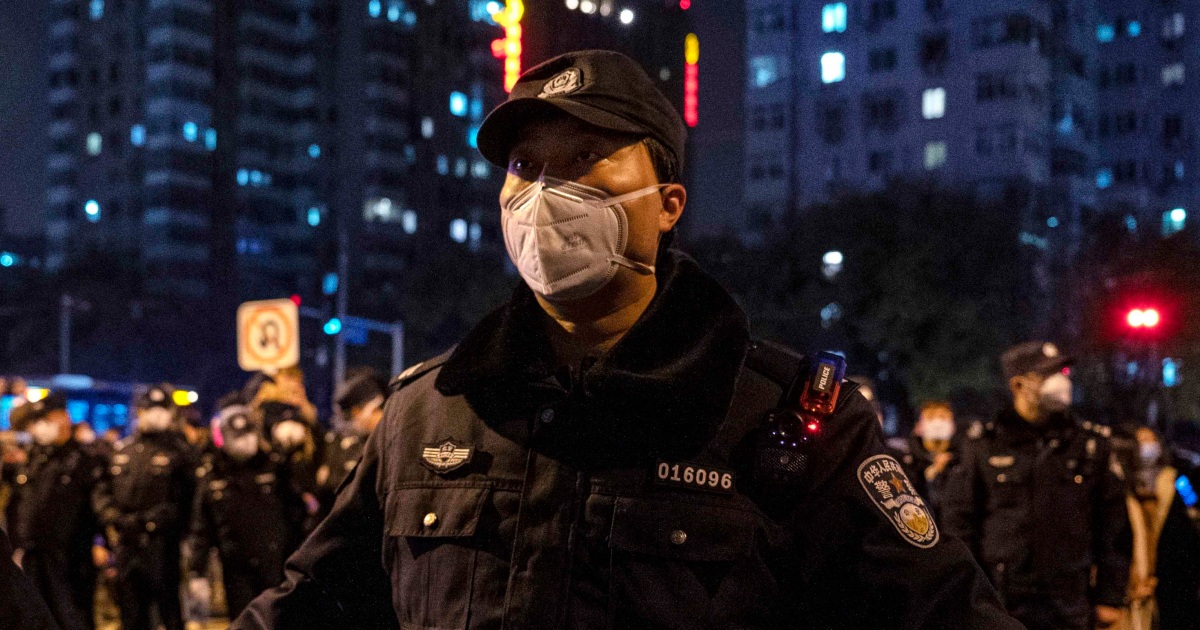By Tuesday, streets that had been filled with protests were walled off and guarded by security personnel, some of whom searched pedestrians’ phones for images or messaging apps that could link them to the demonstrations, according to Reuters.
In Beijing, police protected the site of a protest on Sunday where people sang the Chinese national anthem, including the lyrics «Stand up, people who do not wish to be slaves» and «Stand up, stand up, stand up.»
Many of the protests over the weekend took place on university campuses, which have historically been the cradle of China’s political movements. Tsinghua University in Beijing, where protesting students chanted: “We want a democratic rule of law, we want freedom of speech,” said in a statement on an official WeChat account that it would help students who wanted to go home and study. remotely, citing your health and safety.
While the protests were largely suppressed, scattered incidents of rioting continued. On Monday night in the southern metropolis of Guangzhou, protesters dismantled a Covid-19 testing kiosk, throwing a bicycle and other objects as onlookers cheered and filmed, according to video posted online and geotagged by NBC News. Another video showed more than 30 security personnel wearing shields and white hazmat suits arriving at the scene.
Guangzhou officials announced Monday that mass testing will no longer be required in most districts for the elderly, remote workers, students taking classes online and others who do not need to leave home, in what was deemed an effort to placate the public.
Experts say China will have a hard time getting out of the pandemic without vaccinating more people. Many older people in China have resisted vaccination for fear of side effects or because they saw little risk of contracting the virus in a country with virtually no cases. The proportion of people 60 and older who have received two doses is about 86.4%, according to official data, compared to 93% of people 65 and older in the US.
Chinese vaccines are also considered less effective against the highly transmissible omicron variant, and the government has resisted approving Western mRNA vaccines like those from Pfizer and Moderna as it tries to develop its own version.
The National Health Commission said Tuesday it was especially focused on increasing vaccinations among people over 80, though it did not announce a mandate. Officials will enhance vaccine education, enlist the help of family members and use mobile vaccination vehicles, the agency said, and analyze «big data» to identify older people who need to be vaccinated.
With new, mostly asymptomatic infections still being reported in China (38,421 on Tuesday, up from a record 40,052 the day before), some Covid restrictions are still being tightened.
Starting Tuesday, residents of China’s largest city and its commercial capital, Shanghai, will be required to show a negative PCR test within the last 48 hours (up from 72 hours) to enter restaurants, bars, shopping malls, supermarkets , beauty salons and other businesses. . The restrictions coincide with those implemented in Beijing last week.
Shanghai Disneyland, which only reopened on Friday after being closed for nearly a month after a visitor tested positive for the virus, closed again on Tuesday for an indefinite period.
An op-ed Tuesday in the People’s Daily, the official newspaper of the Chinese Communist Party, said officials at all levels must «unswervingly implement» the government’s covid policies. He did not mention the protests.
“The harder it is, the more you have to grit your teeth,” he said.
Janis Mackey Frayer contributed.

